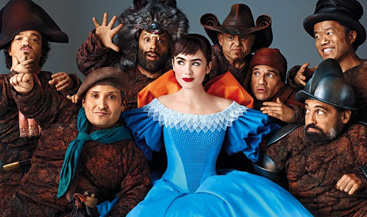|
|
Movie Review: Mirror MirrorNot the Fairest of them All, But Still Fairly FairBy Tom HousemanApril 3, 2012
Despite that consequence, the smartest decision in the film is to turn Mirror Mirror into the Julia Roberts show. While some may question her talent and versatility as an actress, there is no debate as to her ability to preen, flaunt, and act the part of the diva. That is all she is asked to do here, and Roberts is at her best when there is little demanded of her but to be a little outrageous, a little human, and really, really funny. She is matched in energy and panache by Armie Hammer, who is given his first chance at broad comedy for a wide audience and proves that that is where his talent lies. He is charming, yes, but it is the scenes where he gets to make himself look foolish that show just how talented he is. Every character gets their moment to make an impression, and most do their best with it. Nathan Lane can come off as cloying when he is not reigned in, but while his comic relief sidekick to Julia Roberts' villain is far from his best work, he still makes the part enjoyable. Because Roberts does so much by herself Lane feels a little unnecessary, but welcome all the same. Almost every dwarf gets their moment to shine, and shine they do. Unlike Disney's dwarfs, this septet is a well-developed group, and Jordan Prentice, Mark Povinelli, and Martin Klebba all make their characters stand out as interesting and memorable. Sadly, this effect adds up to highlight just how out of place Lily Collins is as the film's heroine. I cannot understand how she continues to land leading roles in high profile films as she is as bland and uninteresting an actress here as she has been everywhere else. Mirror Mirror has far too many flaws to be considered a resounding success. An awful lot of the jokes feel weak and lazy, and attempts to make the film feel fresh and modern often end up being distracting or just dumb. In an attempt to flesh out their story, Walleck and Keller trip themselves on a few snares, and particularly in the beginning Mirror Mirror drags and feels dull before it can get its engine revving. But this is the price one must pay when attempting to tell a new version of an old story, and the film's issues are a result of it attempting something new and a little different. If the flaws outweighed the film's charm then no amount of originality would save it, but fortunately the opposite is true, and Mirror Mirror, while far from perfect and not even terribly memorable, is thoroughly enjoyable, and even a breath of fresh air.
|

|
|
|

|
Thursday, October 31, 2024
© 2024 Box Office Prophets, a division of One Of Us, Inc.


